Directed by Derick (brother of Dirty?) Martini and based on a novel by Andrea Portes, Hick is about a none-too-bright girl (Chloe Grace Moretz) who “runs away to Vegas to find a sugar daddy”…Jesus. You can imagine the rest. Costarring Blake Lively and Eddie Redmayne. Pic will open in select theaters and be available on iTunes and VOD on 5.11.12.
Day: April 26, 2012
Flux Capacitor
I don’t know if I want to see another Back to the Future film, but this guy (name?) is obviously sharp, inventive and passionate. So if nothing else he could get a production gig out of this and…you know, be somebody’s whippersnapper. I love the way he exhales after finishing the riff. And by the way, it’s definitely flux capacitor and not flux capacitator.
Slip of The Tongue
In his review of the French Bluray of Pork Chop Hill (’59) DVD Beaver’s Gary W. Tooze has shown his 1.85 fascist colors by writing that the disc’s aspect ratio “is a surprising 1.66 where I believe the original film would have been 1.85:1.”

Actually, a 1.66 aspect ratio, despite what the fascists will tell you about everything being shown at 1.85 starting in 1954 or ’55 or thereabouts, is completely in keeping with the general aesthetic of the late Eisenhower years. But Tooze doesn’t want to hear it. To paraphrase Gen. Jack D. Ripper, “This is how your hardcore 1.85 commie fascist thinks.”
Outcast Washes Up
I’ve been moaning about not being able to buy a DVD of Carol Reed‘s Outcast of the Islands (1951) off and on for the last four years, and now it’s finally available this month via Amazon UK.
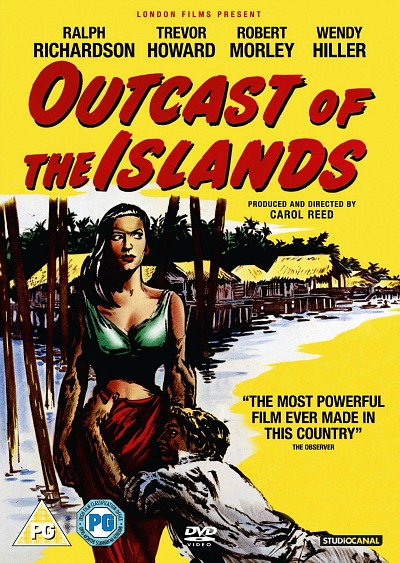
The irony is that I saw it on the tube so many years ago that i can’t remember much of it, but I have a recolleciton of something exceptional. I remember Trevor Howard, of course, who plays the lead. The story mostly takes place in Malaysia. I don’t remember the particulars. I’ve never read the Conrad book, but I’ve been told it’s a bit grim. Ralph Richardson and Wendy Hiller costar. The striking black-and-white cinematography is by Ted Scaife and John Wilcox.
Pauline Kael called Outcast of the Islands “a marvellous film (drawn from Joseph Conrad’s work) that relatively few people have seen. It’s probably the only movie that has ever attempted to deal in a complex way with the subject of the civilized man’s ambivalence about the savage. It also contains some of the most remarkable sequences ever filmed by the English director Carol Reed; it’s an uneven movie, but with splendid moments throughout.
“Trevor Howard is superb as Willems, who makes himself an outcast first through contemptible irresponsibility and through betrayal of those who trust him, and finally and hopelessly when, against his will, he is attracted to the silent, primitive girl, the terrifying Aissa (played by Kerima). Willems is wrong in almost everything he does, but he represents a gesture toward life; his enemy, Almayer (Robert Morley), is so horribly, pathetically stuffy that his family unit (with Wendy Hiller as his wife and Annabel Morley as his child) is absurdly, painfully funny.
“With Ralph Richardson, whose role is possibly ill-conceived, and George Coulouris, Wilfrid Hyde-White and Frederick Valk. The screenplay is by William Fairchild.”
Bad Text Lady
Regal Entertainment CEO Amy Miles became infamous yesterday for suggesting during a Cinemacon panel discussion that texting during a movie might be an okay thing, especially during films “that appeal to a younger demographic.”
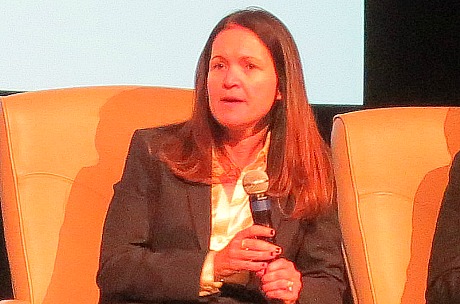
Regal CEO Amy Miles
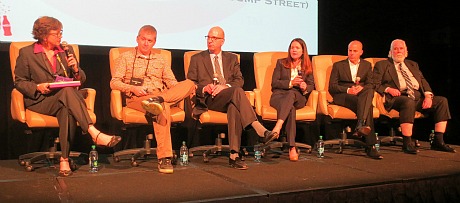
Panelists during yesterday’s Cinemacon discussion about satisfying “savvy” moviegoers, moderated by Anne Thompson (l.) Alamo Drafthouse CEO Tim League is second from left. Regal CEO Amy Miles is third from right.
A couple of hours later Miles showed up at the beginning of Sony’s product-reel show and riffed about how delightful it was that they had so many standard-issue tentpole attractions coming out in 2012 and blah blah.
Between her Sony exhilaration, her views about texting and her good-old-girl cracker accent, Miles become a poster lady for low-rent, anything-for-a-buck, to-hell with-refinement yeehaw attitudes among US. exhibitors. Miles’ “make the money at all costs” ethos combined with her lack of sympathy for decent movie-watching standards indicates that she‘s probably a Republican.
Miles said during a Cinemacon panel discussion about satisfying discerning moviegoers that Regal frowns upon cell phone use during films “but if we had a movie that appealed to a younger demographic” — like 21 Jump Street, she later said — “we could test some of these concepts…something you can offer in the theater that I would not find appealing but my 18-year-old son” might.
That statement didn’t go down well at all with Alamo Drafthouse CEO Tim League, who despises the idea of texting during films and totally forbids it in his theatres. “Over my dead body will I introduce texting into the movie theater,” he said yesterday. “I love the idea of playing around with a new concept, but [texting] is the scourge of our industry…it’s our job to understand that this is a sacred space and we have to teach manners.”
League said that it should be “magical” to come to the cinema. Miles replied that “one person’s opinion of magical isn’t the other’s,” and League replied, “But my opinion is correct.” He’s right, of course. People like Miles are the enemy.
Turn Of Phrase
N.Y. Times critic Ben Brantley has pointed out an interesting political current in The Columnist, David Auburn‘s “scrupulously assembled historical drama” about hard-hitting columnist Joseph Alsop (John Lithgow) that has just opened on Broadway.
“The political part presents Joe as a fearsome dinosaur,” Brantley notes, “a fierce advocate of the war in Vietnam whose power begins its inexorable decline with the assassination of Kennedy. The play ends with the dawning of the Age of Aquarius, with Joe recoiling from the light like a vampire at sunrise.”
I had dinner with Lithgow in Cortina d’Ampezzo , Italy, almost exactly 20 years ago. I was doing a N.Y. Times interview with Sylvester Stallone during the filming of Cliffhanger, and it was suggested by the unit publicist that I should hang with Lithgow a bit. Lithgow didn’t say anything too specific, but the tone of his comments provided the first hint that Cliffhanger might be somewhat dismissable.
Django Flavorings
Entertainment Weekly has posted two stills from Quentin Tarantino‘s Django Unchained (Weinstein Co., 12.25) along with a chit-chat between staffer Anthony Breznican and costar Jamie Foxx.
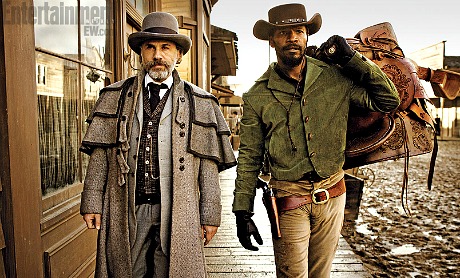
Pleae take note of the Entertainment Weekly logo in the upper left portion. That means they were given this photo as an exclusive.
Does Foxx think Django Unchained will be controversial?,” Breznican asks. “Naah,” says Foxx. “It’s going to be kind of a quirky but sorta mild-mannered, laid-back Monte Hellman-type film with nice long shots of pastoral western vistas and a kind of you-are-there historical verisimilitude with prairie dogs and snakes and coyotes howling in the night.”
I’m kidding…kidding! Foxx actually says, “Oh, hell yeah…you kidding me?”
I’ve read the script but here’s the EW synopsis: “After being sent to a chain gang after rebelling against his owners, Django is recruited by a German bounty hunter (Inglorious Basterd‘s Oscar-winner Christoph Waltz) to help him settle an old score. Django has information that Waltz’s Dr. King Schultz needs, so the German mercenary liberates the slave and promises that if he helps him kill the Brittle Brothers, Django’s old owners, he’ll make it worth his while.”
“He says, ‘I’ll kill ’em, and you’ll get some money and be on your way as a free man,'” Foxx tells Breznican.
The Brittle brothers? Is that like the Vega brothers only 150 years earlier?
“Along the way, the duo end up crossing paths with Leonardo DiCaprio‘s hammer-wielding character, a deranged plantation owner named Calvin Candie, who likes to make his toughest slaves fight to the death in gladiatorial combat. ‘Candie is a business man who owns a plantation called Candie Land, and that’s where my wife ends up being,’ Foxx says. To find her, ‘we have to get in good with Candy, by me playing a valet for Christoph’s character.’
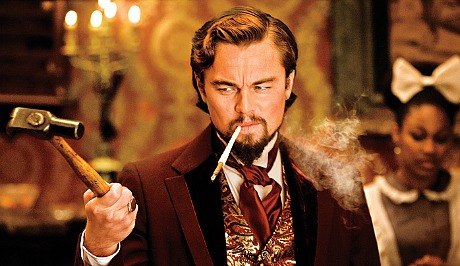
Leonardo DiCaprio as the hammer-wielding Calvin Candie — a mixture of Daniel Day Lewis’s Bill the Butcher from Gangs of New York mixed with Simon Legree.
“Candie Land”? Like an amusement park? How many employees? Is there a big “Candie Land” sign illuminated by candles at night? Did DiCaprio’s character get that name from a relative of P.T. Barnum? Does Mr. Candie sell hot dogs and popcorn and hard candy on the side?
“There’s a beautiful way [Tarantino] found for the characters to talk to each other,” Foxx explains. “It’s mindblowing. You’ve never heard it this way. You’ve seen movies deal with slavery or westerns that never dealt with slavery. Do it the safe way. This way is like…wow.”
Ultimately, Breznican writes, Django Unchained “is a story about the heart, and the way cruelty can destroy the things we love most.” Sorry but I kinda doubt that. I suspect that Django Unchained is ultimately about the movie references and spaghetti western memory threads in Tarantino’s head. All QT does (and all he ever will do) is riff on genre movies that he loved back in the ’70s and ’80s.
“All Django wants to do is get his wife,” Foxx concludes. “He’s not trying to cure or solve slavery. He just wants to get his life back.” So he and his wife can return to their home in a trailer park near Orlando and kick back with the brewskis and ESPN on the flat screen and the barbecue in the back yard and play with the kids and their pet alligator?
In April 2007 Tarantino told the Telegraph‘s John Hiscock that Django Unchained would be “a southern,” or a kind of spaghetti western set in America’s Deep South. He said he wanted “to do movies that deal with America’s horrible past with slavery and stuff but do them like spaghetti westerns, not like big issue movies. I want to do them like they’re genre films, but they deal with everything that America has never dealt with because it’s ashamed of it, and other countries don’t really deal with because they don’t feel they have the right to.”
So while Inglourious Basterds was a revenge-payback movie about making Nazis suffer for being anti-Semitic swine, Django Unchained is some kind of payback-revenge movie about American racism and slavery.
